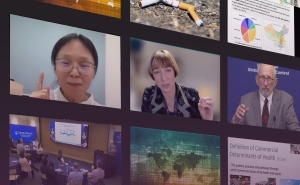Johns Hopkins Selected by U.S. Department of Transportation to Lead New $10 Million Center for Climate-Focused Transportation Solutions
Center, one of 34 across the U.S., will lead consortium research focused on preserving the environment through transportation solutions

Johns Hopkins University has been selected by the U.S. Department of Transportation to lead a new University Transportation Center focused on solutions aimed at preserving the environment.
The transportation sector is currently the largest contributor to climate change in the U.S. The Johns Hopkins-based Center for Climate-Smart Transportation will collaborate with a consortium of experts to research ways to mitigate climate change in the transportation sector, with an emphasis on equity and environmental justice. USDOT has awarded $10 million over five years to fund the consortium’s research and translation at the intersection of climate change, public health, and transportation.
The consortium includes experts from the Massachusetts Institute of Technology, the University of Texas Austin, the University of Utah, Morgan State University, and Diné College, a public tribal land-grant college serving the Navajo Nation. Morgan State is part of the network of historically Black colleges and universities.
“Climate change should be at the center of transportation decisions at all levels,” says Shima Hamidi, PhD, Bloomberg Assistant Professor of American Health in the Department of Environmental Health and Engineering, which spans Johns Hopkins University’s Bloomberg School of Public Health and the Whiting School of Engineering. Hamidi will be the principal investigator and director of the Center for Climate-Smart Transportation. “Without comprehensive mitigation and resiliency strategies implemented at all levels of government, greenhouse gas emissions from transportation—and the associated health and quality-of-life impacts of climate change—will only increase in the next two decades.”
The USDOT’s University Transportation Centers have served as the agency’s research arm since 1988, informing transportation policy and practice at the local, state, and federal level. For this year’s grant awards, the USDOT received 230 grant applications, the largest number in the program’s 35-year history. This year’s grants are funded through the Biden administration’s infrastructure package through 2026.
The Center for Climate-Smart Transportation initial focus area will explore how alternative fuels such as solar and biofuels can be used in transportation. Another priority for the Center will be paving the way to achieve net-zero emissions. Hamidi notes that electric vehicle technology in its current form is not a path to net-zero emissions, since on average, 60 percent of the electricity used by these vehicles is generated from nonrenewable fossil resources.
The Center’s researchers and consortium colleagues will also study ways to advance other net-zero emissions policies such as reducing per-capita vehicle miles traveled and promoting transit investment as effective climate solutions.
“These goals will be achievable through collaboration with local communities and states across the U.S. to co-create solutions that meet needs and align with common values around climate change,” says Hamidi. “Addressing environmental justice through community-centered research will be the focal point of all programs and activities at the Center for Climate-Smart Transportation.” Community-centered research involves community stakeholders in all phases of research, from the initial problem statement to data collection to policy formulation to practical implementation.
The Center will leverage resources and expertise across Johns Hopkins University, including the Ralph O’Connor Sustainable Energy Institute, which focuses on energy, alternative fuels, and climate change; the Bloomberg American Health Initiative at the Bloomberg School of Public Health, which focuses on five areas, including climate change and environmental challenges; and the Center for Community Health: Addressing Regional Maryland Environmental Determinants of Disease (CHARMED), which focuses on capacity building and community-centered research in climate change, and environmental justice.
# # #
Media contacts: Danielle Underferth at dunderf1@jhu.edu and Barbara Benham at bbenham1@jhu.edu.





